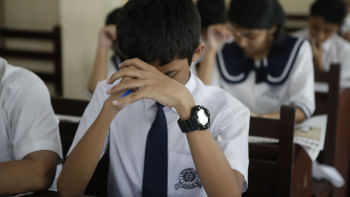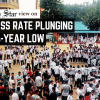Why five-hour SSC exams will not be in students’ best interest

The Ministry of Education in Bangladesh has officially declared that, commencing in 2025, the duration of the Secondary School Certificate (SSC) examinations will be prolonged to five hours. This resolution has sparked considerable disapproval from multiple sectors, prompting inquiries into the underlying justification for this adjustment.
Historically, the SSC examinations in Bangladesh have adhered to a three-hour format, placing students under significant stress within a fiercely competitive scholastic landscape. Nevertheless, the recent initiative to prolong the duration of these assessments by an extra two hours is widely perceived as a misguided endeavour aimed at enhancing educational standards within the nation.
According to a Somoy News report, the National Curriculum and Textbook Board (NCTB) recommended that students will have to take five-hour-long Secondary School Certificate (SSC) and equivalent examination tests starting next year under the new syllabus. While the education ministry justifies the move as a means to enhance a more thorough evaluation of students' knowledge, many argue that it may contribute to heightened levels of stress and anxiety among students.
The upcoming academic year will introduce a curriculum consisting of 10 subjects for Grade 10 students, including Bengali, English, mathematics, science, history and social science, digital technology, life and livelihood, religious teachings, health safety, and arts and culture. These subjects will form the basis for the SSC exams. Students will undergo assessment through project work, problem-solving tasks, assignments, and written tests. The evaluation process will encompass activities such as investigation, exhibitions, model preparation, presentations, examinations, and planning.
A primary critique of the decision pertains to the potential imposition of extended examination durations on students. The prospect of enduring a five-hour exam, despite an allotted recess period, is deemed excessively taxing and raises concerns regarding its adverse impact on students' mental and physical health.
Additionally, there is apprehension regarding the potential adverse effects of the prolonged examination period on students' academic outcomes. Enduring a five-hour exam may lead to fatigue and diminished focus, potentially hindering students' capacity to demonstrate their full potential.
Another concern is the decision's oversight of the disparities present in the educational framework. Discrepancies in resource availability and support structures among students have not been duly acknowledged and may lead to unequal preparedness for a five-hour examination. Consequently, this may exacerbate the existing divide between individuals hailing from different socioeconomic backgrounds.
The decision made by the education ministry is particularly concerning because of the absence of engagement with key stakeholders. The lack of consultation with students, parents, and educators suggests a unilateral approach taken by the ministry. This exclusion has resulted in feelings of marginalisation and disregard among those affected.
Moreover, there is limited evidence supporting the notion that extended exam durations contribute to improved educational quality or student achievement. Rather than being grounded in evidence-based practices, this decision appears to be driven by a flawed assumption that longer exams automatically translate to enhanced educational standards. In reality, such a strategy is likely to have adverse effects, placing undue pressure on students and diminishing the overall learning environment.
Furthermore, the choice to prolong the SSC examination period appears to diverge from global educational trends. Many nations are shifting towards more adaptable and inventive assessment approaches that prioritise assessing students' analytical thinking, problem-solving skills, and ingenuity rather than solely depending on conventional, time-constrained exams.
Apart from the apprehensions regarding the impact on students' well-being and health, there are also pragmatic factors to consider. Extending examination durations will necessitate substantial logistical modifications, such as revising exam timetables, employing additional invigilators, and enhancing security measures. All of these adjustments will entail a significant financial burden for the government. Instead, the money could be allocated more effectively towards other endeavours aimed at enhancing the educational standards in Bangladesh.
For instance, the education ministry may contemplate incorporating more frequent assessments throughout the academic year, rather than depending solely on a solitary, extensive exam. Instead of fixating solely on exam lengths, emphasis should be placed on tackling more urgent concerns like enhancing teacher preparation, modernising the curriculum to align with contemporary requirements, and allocating resources and infrastructure for schools nationwide.
The recent announcement by the ministry to prolong the duration of SSC not only imposes additional pressure on students but also overlooks the disparities present in the education sector. Instead of enforcing lengthier exam periods, it is recommended that the education ministry investigates alternative approaches that are equitable and accommodating to students. The perspectives of students, parents, and educators must be taken into consideration when making decisions concerning the educational framework.
Md Ziaul Haque is a poet and an assistant professor of English at the University of Creative Technology Chittagong.
Views expressed in this article are the author's own.
Follow The Daily Star Opinion on Facebook for the latest opinions, commentaries and analyses by experts and professionals. To contribute your article or letter to The Daily Star Opinion, see our guidelines for submission.

 For all latest news, follow The Daily Star's Google News channel.
For all latest news, follow The Daily Star's Google News channel. 










Comments